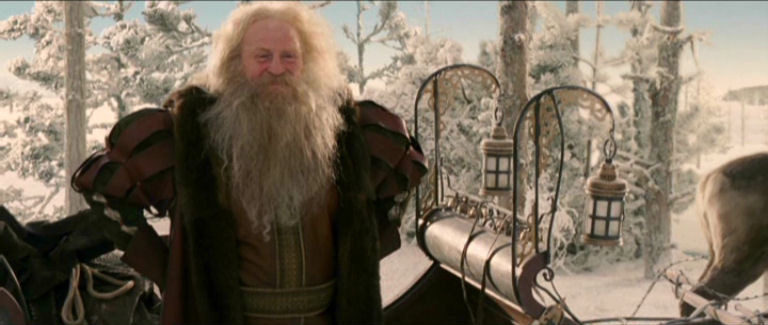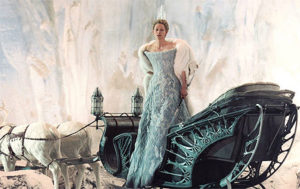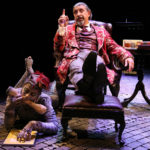Speculative Faith Reading Group 6: Greed and Gifts
Last week we almost didn’t have the reading group at my church; I was battling a cold and I believe God helped me recover just in time to have a fantastic, and prolonged, discussion about Aslan. Good and evil themes are increasing in LWW, and in these chapters we see even more clearly the distinction between the two — along with God-exalting, reality-reflecting truths of what really causes evil, and the seriousness of fighting it.
Chapter 9: In the Witch’s House
- After readers stay with the three Pevensie children, and Mr. and Mrs. Beaver, in the previous chapter, do you appreciate that after the break (and “There’s not a moment to lose” cliffhanger) that the author immediately answers what all readers surely want to know: What happened to Edmund and where is he? How would you feel if Lewis instead resumed at the Beavers’ lodge to show them all preparing to escape? A bit let down?
- Lewis doesn’t leave us to wonder about what Edmund is thinking. Instead he explains Edmund’s motives in great detail. Does this make Edmund’s attitude better or worse?
- “She was jolly nice to me, anyway, much nicer than they are. I expect she is the rightful Queen really. Anyway, she’ll be better than that awful Aslan!” At least, that was the excuse he made in his own mind for what he was doing. It wasn’t a very good excuse, however, for deep down inside him he really knew that the White Witch was bad and cruel.(page 89)
- Whoa! Edmund isn’t “misunderstood,” or even deceived — he is actively deceiving himself, despite what he himself knows to be true! Might that startle us?
- How does this compare with other stories’ villains who are themselves lied to, or being controlled, or otherwise have something good about them deep down inside? How often do some stories show villains who somehow can’t help what they do? How often do other stories more clearly show villains who are truly, gladly evil?
- Does this mean Edmund can’t be redeemed? What would it take to stop his lies?
- How does Edmund’s trouble in the winter make you feel? What do you think about his imaginations to re-make the world of Narnia how he thinks it should be?
-
When Edmund arrives in the Witch’s courtyard, how do you react to his mockery of the stone lion? Why doesn’t it work? “The great stone beast still looked so terrible, and sad, and noble, staring up in the moonlight” (page 96). How does this make you feel?
- Similarly, recall the first time you read this spooky scene. (The 2005 film showed it very well, but use your own imagination!) How does this make you feel, and keep reading?
- Edmund doesn’t seem surprised by the Witch’s angry reaction. Why not? Do you want to yell at him? Or, perhaps, might you nod your head soberly and say, “Yes, this is exactly how it is when we’re sinning, committing treason against God, and knowing it”?
Chapter 10: The Spell Begins to Break
- What do you think about Mrs. Beaver’s comical reluctance to leave the lodge without over-packing? Is this mainly for fun, or for some Deeper Meaning, or another reason?
- (The movie made this clear, yet the book is subtler.) What makes them worried about the bells they hear? Did you notice the difference between the last line of the previous chapter, when the Witch says, “Make ready our sledge … and use the harness without bells” (page 99)? Who truly used the sleigh and reindeer first — her, or Father Christmas? How else do evil people often steal and try to corrupt good ideas and things?
- According to Father Christmas, who just “got in” to Narnia again, who weakens the Witch’s magic — the hope the children brought, or the fact that “Aslan is on the move”?
- Why do the children respect Father Christmas as if he’s a saint, with spiritual authority?
-

“Merry Christmas! Long live the true King!”
Receiving gifts, like special weapons, is a common theme in fantasy tales. How is such a moment usually presented? Here Father Christmas says, “These are your presents … and they are tools not toys. The time to use them is perhaps near at hand. Bear them well” (page 108). How might this help us think of our own gifts, or even real weapons?
- This story entertains, yet also has serious moments like these. Why do you think that is?
- Why do you think Father Christmas says to Susan, “I do not mean you to fight in the battle,” and to Lucy, “You also are not to be in the battle” (pages 108-109). Does he mean they aren’t capable of bravery or skill? But he says, “That is not the point … battles are ugly when women fight” (page 109). That is his reason. By contrast, are battles notugly when men fight? What do you think he means by this? And is it a Biblical concept?
- By contrast, the second recent Narnia film, Prince Caspian, threw Susan and even Lucy into battle with the boys and creatures. Did this seem realistic or good?













































Don’t even get me started on the fight scenes in Prince Caspian…just, don’t. It was just another straw on the camel’s back.
After our discussion on the seriousness of the children’s gifts (sword, dagger, bow and arrows) today, I felt this Game of Thrones Clip really helps to show how serious the responsibility of killing someone is.
To set up the scene:
Eddard Stark (The lord dude in this story) has the responsibility to execute a deserter. He refuses to just sit back and let someone else be the executioner, because “The man who passes the sentence, should swing the sword”. He knows that death is a serious thing and should be treated as such. He has his sons, including the youngest (10) watch so that they remember what a responibility it is to take someones life. What is not shown in this clip, is that Eddard doesn’t forget about what has happened; he spends hours in mourning and prayer afterwords.
*note: given that this is an HBO series, the execution is a little on the graphic-real-to-life side.
He’s still primarily motivated by selfishness, but he has lost the ability to see the circumstances clearly. I don’t think this makes his bad attitude worse or better; it’s just a sinful attitude, the same as it always was.
He had seen some evidence of the Witch’s cruelty. He definitely knew that Lucy was really telling the truth, and so he would have known that Tumnus had also told the truth to Lucy, based on what he’d seen.
I agree that Edmund was definitely not misunderstood, but I feel that to some degree, he really has lost the ability to think clearly and decide what to do. He ate the bad candy, and that was sort of selling his soul to the Devil (only as the saying goes, the White Witch is definitely not an allegory of Satan). Of course, that was only his own fault.
It’s got to be significant that he couldn’t enjoy his wholesome dinner with the Beavers because he wanted Turkish Delight, “and there’s nothing that spoils the taste of good ordinary food half so much as the memory of bad magic food.” Here, the magic is explicitly “bad,” and the ordinary is good. The goodness or badness of “magic” — or whatever magic stands for — seems to be a major theme, and eating seems to be one of the ways that this theme is alluded to. Edmund seems to be the total opposite of Lucy in so many ways. When Lucy believes in magic, he scoffs. When Lucy enjoys simple and wholesome, non-magical nourishment, Edmund lusts for unwholesome enchantment. I don’t think I see where Lewis is going with this.
Practically, his dreaming about being king is pretty foolish, because those future plans can’t help prevent him from getting lost and freezing to death in his miserable present. However, that is the main reason that he indulges in those dreams; he doesn’t want to face the harsh, dark reality (the external reality of the cold, dark night, but possibly also the spiritual and social realities of his betrayal).
That scene is so well written that the second-last sentence of that paragraph, telling how Edmund didn’t get any fun out of jeering at it, is almost unnecessary. For one thing, Edmund’s taunting sounds totally pathetic and hollow; he’s a loser as a bully. Based on what we just read about Edmund’s motivations, we can assume that Edmund’s taunts fall hollow even in his own ears. There’s nothing tough about making fun of someone who can’t even try to get even.
There would probably be a moment of genuine terror here for unspoiled first-time readers, wondering if the stone lion might really be Aslan.
Well, nothing bad comes of Mrs. Beaver’s preparations, and she is not shown to be foolish in any way. I would have thought that the “Deeper Meaning” in such a situation would be that good Pilgrims must not be weighed down by the Cares of This World as they journey to the Celestial City, but that is clearly not the intent here.
That’s a great observation! I think the first time we meet the White Witch, with her sleigh and her bells and her reindeer and her “elf” (the dwarf driver), there is a sense of horrific wrongness, because whether we think of Santa or not, we know that these things are supposed to be associated with joy and happiness.
Aslan. Was “the hope the children brought” the movie version? I don’t remember.
I don’t know what implies “spiritual authority,” other than his serious, inspiring aura. But I suppose “Father Christmas” could have been used to imply priesthood. Isn’t the Santa-figure really a “Saint” in the Catholic sense, according to the real-world legends? I don’t think Lewis was more than just nominally Protestant; I wouldn’t be surprised if he used the concept of saint/priesthood.
But I think this misses the point. The children respect Father Christmas because he is an angel, in a way. He’s essentially fulfilling the role of Gabriel. He is the herald of the coming of Aslan, of Aslan’s Mas. His appearance here is both a hint about Aslan’s role, and also about the fact that our world are Narnia are tied together in the Narnian mythos.
This is as solemn and honorable of a bequeathing as in any fantasy, I think. Christmas should be the time of profoundly serious joy that this scene expresses. This is how we should give and receive gifts, as tools to be borne well, even if sometimes they might happen to be “toys.”